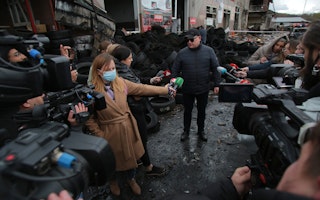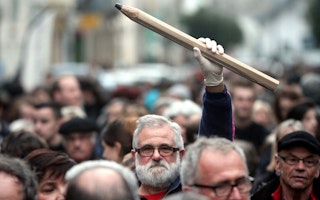New Industry Standards Aim to Protect the Lives of Freelance Journalists
By Marius Dragomir & Stewart Chisholm
On January 22, 2014, Mexican freelance journalist Temoris Grecko was abducted by a criminal gang near the Syrian town of Aleppo. He was heading to Al-Ezaa, a town in northern Syria where fighting had erupted the day before. After 12 hours of being held captive, Grecko was freed.
It was all in a day’s work for the valiant freelancer, whose coverage has spanned to date over 90 countries, many of them dangerous, conflict-ridden places. He has drunk with Tuareg nomads in the destitute town of Timbuktu, argued with Al Qaeda supporters in the Sahara Desert, and rapped with Palestinian MCs in Ramallah.
Despite the dangerous nature of his work, he has managed to survive while many of his fellow journalists have not—journalists like Kenji Goto, the Japanese freelance videographer who was brutally killed by ISIS forces earlier this month in Syria.
Killings, imprisonments, and abductions of journalists have reached historic highs. In response to this, on January 12 at Columbia University’s School of Journalism in New York, a coalition of leading press freedom groups and news organizations unveiled a new set of global safety principles for freelance journalists.
The principles included a call for all news organizations to take into account the safety of freelancers, who often work without the protections enjoyed by journalists employed full-time. “News organizations and editors should endeavor to treat journalists and freelancers they use on a regular basis in a similar manner to the way they treat staffers when it comes to issues of safety training, first aid, and other safety equipment, and responsibility in the event of injury or kidnap,” state the standards.
Despite reporting in riskier environments, freelancers frequently work under poorly negotiated contracts, and are often not given bylines or recognition for their work—two areas the standards also call on media organizations to remedy.
Tina Carr, director of the Rory Peck Trust, a UK-based NGO dedicated to protecting and promoting the rights of freelancers globally, said that protection for freelancers is not a new battle, but one that news organizations and the public need to be reminded of on a regular basis.
“We’ve been helping, speaking, and writing about freelancers for almost 20 years,” Carr noted during an awards ceremony for freelancers held in London in November. In an interview last month with the Open Society Program on Independent Journalism, she noted that the Trust has been a leading backer of the new global standards, serving as both a signatory and promoter of the calls for action enshrined therein.
Many of the journalists with whom we spoke welcomed the standards with open arms. “It is an absolutely necessary and useful initiative for journalists anytime, not just in war or social conflicts,” said Jose Reveles, a veteran Mexican crime reporter who has authored landmark books on drug cartels. “Preventive action and rigorous measures are essential for self-protection.”
“The application of the principles would both protect journalists’ integrity and improve the overall quality of coverage coming from conflict zones,” said Juan Esteban Lewin, editor of La Silla Vacía in Colombia. These principles will be viable as long as all media push ahead with them and engage with freelance journalists working for them, said Elia Baltazar, co-founder of the Mexican journalist organization Periodistas de a Pie.
But others pointed out that application of these standards will require financial support, and Grecko wondered how these principles could actually be implemented by smaller media in developing economies, where “not even freelancers working for mainstream media can deal with the expenses of ballistic clothing, conflict-zone insurance, and hostile-environment courses.” Only one out of 81 journalists killed since 2000 in Mexico worked for mainstream media, he said, and most of those assassinated worked for very small local media, some of them earning as little as US$2 per article.
“[These principles] seem designed for journalists going in and out of conflict areas, not those living in them and taking their children to the same schools attended by the children of those mafia bosses they write about,” said Grecko.
The safety situation for journalists remains dire. According to the Committee to Protect Journalists (CPJ), between 2002 and 2012, 506 journalists were killed worldwide, up from 390 the previous decade. “Journalists are now seen by many combatants, especially jihadis, as legitimate targets and valuable propaganda tools, alive or dead,” reported a recent New Yorker article. The CPJ has also signed on to the new safety standards with cautious optimism, noting them as “a first step towards better safety for freelancers.”
The Program on Independent Journalism supports many efforts to keep journalists safe. It has funded, among others, the Rory Peck Trust, the CPJ, and many local organizations dedicating to protecting journalists in Mexico, Pakistan, and Ukraine, just to name a few. An important component of this work has been working with UNESCO in supporting the United Nations Plan of Action on the Safety of Journalists and the Issue of Impunity, in attempt to get governments to develop legal frameworks and provide funding to protect journalists, building on model frameworks, such as the one developed in Colombia.
But what has been glaringly lacking from the list of signatories on the standards thus far is news organizations. Out of the list of 26 signatories, only half are news outlets—they include the BBC, Bloomberg, the Guardian Group, and the Associated Press. Other backers of the standards initiative have said they hope the number of media outlets investing in such efforts will grow by at least 30 over the next year.
“Media companies cannot continue complaining about the lack of quality in journalism without addressing key issues on labor and safety conditions. An initiative […] like these principles must be supported and celebrated,” said Fernando Ramírez, editor of La Patria newspaper in Manizales, Colombia.
Getting the media globally to fund safety training, insurance, and protection for its own staff remains an uphill battle, but one worth fighting. Ultimately, the media should be encouraged to put their money where their mouth is and support such initiatives not only in words, but also in deed, with financial backing and support from their owners and editors.
Primavera Téllez Girón in Mexico City and Carlos Cortés in Bogota contributed to this article.
Until August 2016, Marius Dragomir was senior manager and publications editor with the Open Society Program on Independent Journalism.
Until December 2016, Stewart Chisholm was an associate director with the Open Society Program on Independent Journalism.


